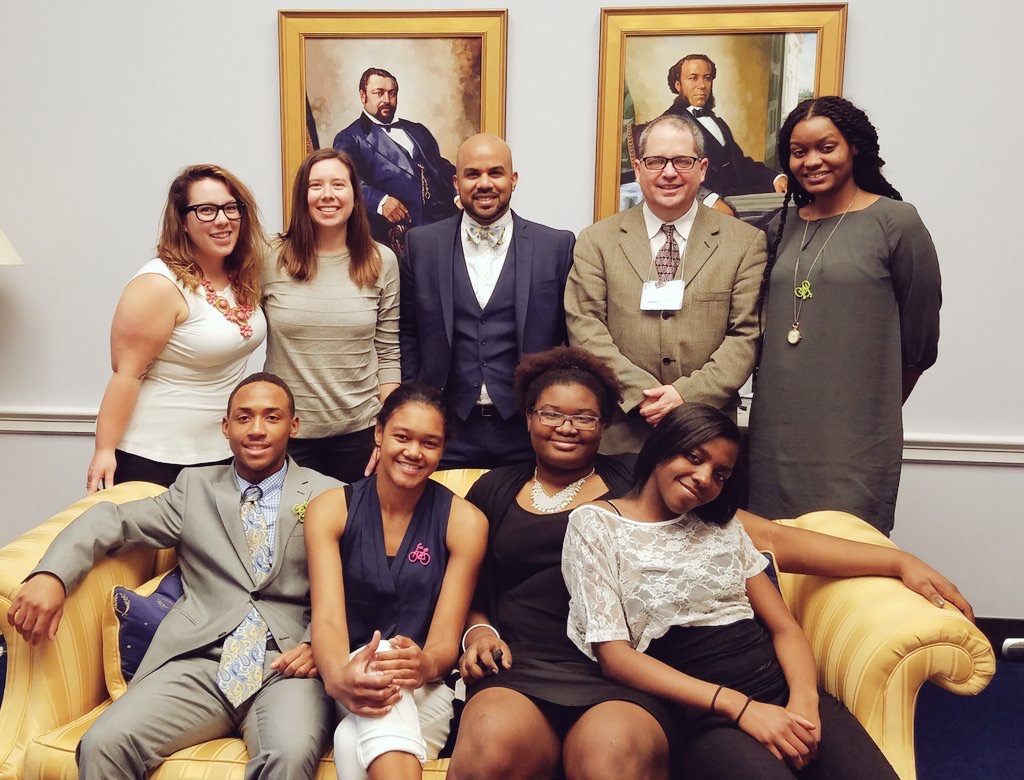Breaking Down Bike Barriers

What if we could help eliminate 53,000 premature deaths a year by making safe cycling more accessible? That is what I asked Senators Patrick Toomey and Robert Casey, Jr. and Representative Chaka Fattah during the National Bike Summit and Women’s Forum Lobby Day. This year, on behalf of Clean Air Council, I joined advocacy organizations Bicycle Coalition of Greater Philadelphia (BCGP) and Bike Pittsburgh (Bike PGH), leadership development organization Cadence Youth Cycling (CYC), and bike manufacturer Advanced Sports International (ASI) in Washington, D.C. for the League of American Bicyclist’s annual event.
The number 53,000 comes from the Massachusetts Institute for Technology’s ground-level emissions study that found road transportation is the most significant contributor to air pollution deaths. According to the National Household Travel Survey, 50% all trips made by Americans are 3 miles or less. While 3 miles is equivalent to about a 15 minute bike ride, 72% of those trips are made by a vehicle. While some short trips are necessary by car, many could be made by bike, but are not due to barriers to biking. Some of these barriers include fear, safety, and costs. For example a person wants to bike, but does not or cannot because:
- They do not know how to ride a bike
- They don’t know safe routes or there are no safe routes
- Streets/bike lanes are not maintained
- Bike infrastructure, such as bike lanes, multi-use trails and bike racks, is lacking
- Cost of buying a bike and helmet is too high
To address these barriers, we asked Senators Toomey and Casey, and Representative Chaka Fattah the following:
Cosponsor Personal Health Investment Today (PHIT) Act H.R. 1218 & S. 2218
The PHIT Act would allow individuals or families to pay for bicycles, bike education classes, ride fees as well as other fitness equipment and gym memberships with dollars from pre-tax accounts, like flexible spending accounts (FSAs) and health savings accounts (HSAs).
Support our state funding bicycling and walking safety education and enforcement through the State and Community Highway Safety Grant (section 402) and National Safety Priority (section 405) Programs
Funding for non-infrastructure safety projects, like the bike education classes offered by BCGP and Bike Pittsburgh, has been limited by the Fixing America’s Surface Transportation Act. The State and Community Highway Safety Grant program is available for walking and cycling education, however it has been rarely, if ever, used for that purpose. While the National Safety Priority offers non-motorized safety programing funding, it is only available to states whose combined pedestrian and bicycle fatalities exceed 15% of the total annual crash fatalities. So for many states, the State and Community Highway Safety grant is the only funding available for non-infrastructure safety projects.
Support the elimination of the Bicycle Occupancy Permit
The Bicycle Occupancy Permit (BOP) is a major discouragement to municipalities who wish to install bike lines on state roads. Pennsylvania requires such municipalities, except Philadelphia and Pittsburgh, to assume all liability as well as responsibility for installing the infrastructure and maintaining that section of the state road. A bike lane that crosses multiple municipalities is even more difficult to install because all municipalities must sign the BOP. Municipalities are not required to agree to these responsibilities for conventional road projects.By designing streets for all road users and making it easier to buy a bike as well as learn how to ride it, more people will have the option to bike for short trips rather than drive. According to the EPA, if half of the short trips by car were replaced by bike, we would save 2 million metric tons of CO2 emissions per year which is the equivalent to taking 400,000 cars off the road per year.With the bike-friendly streets of Washington, D.C. as our background, the Legislative Aids heard our diverse group of cyclists and organizations lobby for the three “asks.” Representative Fattah’s Legislative Director said that that the Representative supports our agenda and will cosponsor the PHIT act. The Senators’ aids only promised to bring our requests to the Senators. Even though there wasn’t full support for our “asks,” it was amazing to see advocates, youth groups, industry leaders and environmental organizations, who don’t necessarily have the same mission, come together for the same goal.
If you would like to help pass the PHIT Act, send a message of support to your members of Congress now.

